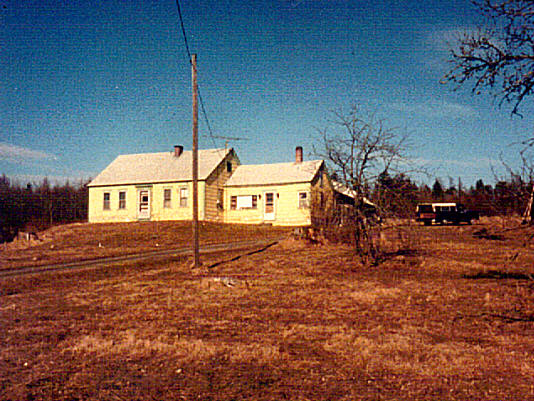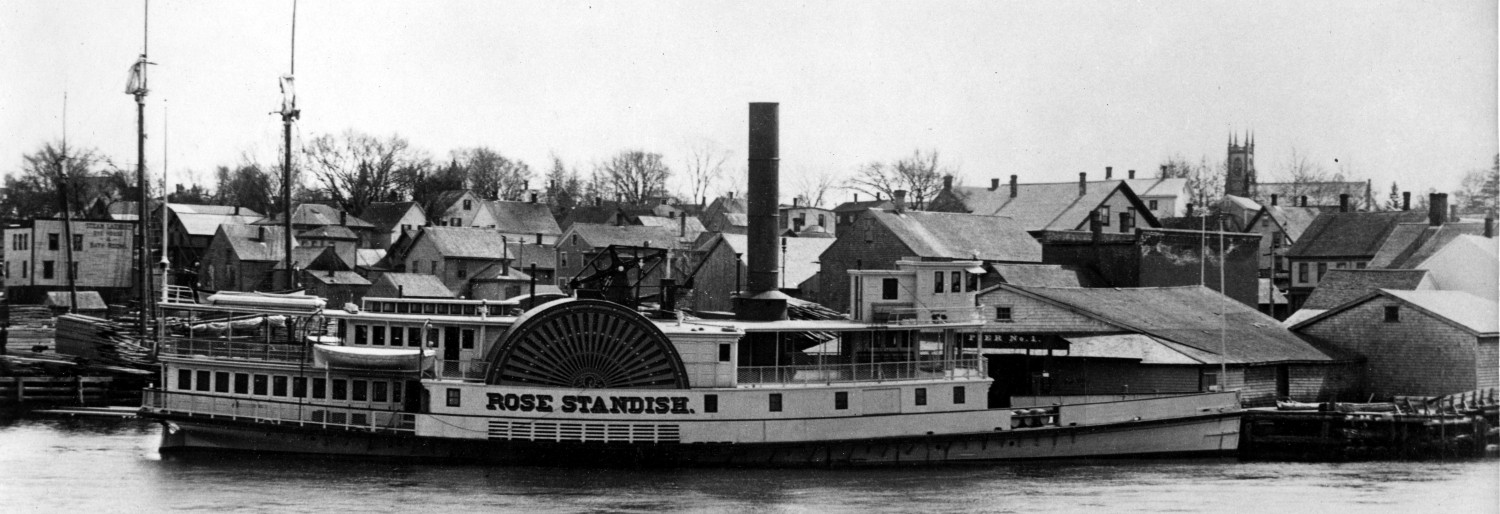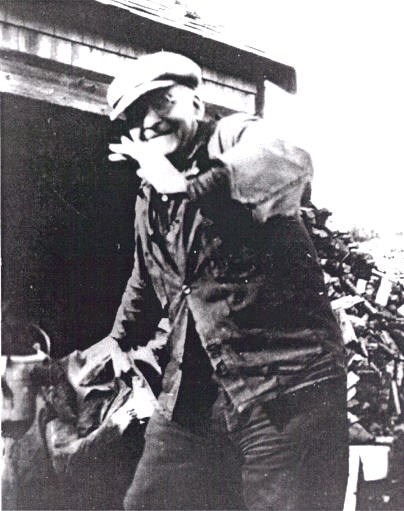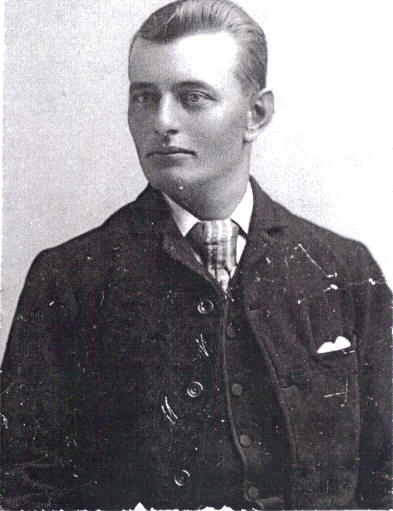When hunting season rolls around it always brings to mind those days long past when there was no hunting season, folks could hunt year round without licenses,bag limits etc and all those other legal inconveniences of today. When the game laws were instituted back in the late 1800s the hunting habits of many changed not a whit – they simply became poachers. Two of the most notorious were George Magoon of Crawford, top and Wilbur Day of Wesley. We recently came across a Day/Magoon story and felt it an appropriate time to share it with you. Its authorship is unknown but it the story probably dates from about 1900.
INSEPARABLE POACHER PRANKSTERS
J. Wilbur Day and old George Magoon were inseparable friends from early boyhood, and they could dish it out and more important, they could take with a grin, whatever the other had to offer in the line of pranks, and there were many offerings.
One hunting season they were camped on the shores of Pokeymoonshine Lake with some hunters from out state that they were guiding, and they were having a little hard luck in seeing any deer. One evening after supper they were talking things over and J. Wilbur spoke up in sort of a drawling voice, “Well boys I’m gonta go out tonight and see if I can shine me a deer and get us some camp meat somehow-or-other.” So while he was waiting for the moon to set so it would be good and dark, he rummaged around under his bunk and dug out the old furgerson headlight, and proceeded to clean it up, fill it with coal oil, light it, and trim the wick to the satisfaction of a professional. While he was doing all this, old George was cleaning and reloading the old muzzle loader. J. Wilbur, who had been watching George rather skeptically through the corner of his eye, said, “George, you ain’t putting too much powder are you George.” “Oh no, only about two fingers for a weakling, I like about three fingers myself.” Wilbur fastening and adjusting the headlight on his head, and taking the gun that George had been a little too liberal with the powder in loading, started up a trail that led to what should be a good area to find a deer. He had been walking and listening for about two hours when off to his left he saw a pair of eyes shining like two little blue moons. Carefully he raised the old musket, took a good aim and pulled the trigger. BANG!
Wilbur picked himself up and groped around in the darkness and found the headlight that had gone out in the explosion and after a while he finally got it straightened out enough that he could light it, and have some light to find where the gun landed.
He picked up the gun and proceeded over to the spot where the deer was standing when he fired, and there it was. Only instead of a deer, he had fired at two bright and shiny tin can covers nailed to a maple tree about three feet up from the ground.
On the way back to camp he was doing some deep thinking for a while then he began to chuckle. Now he knew why George had been carrying around two tin can covers in his frock pocket up until three days ago, which he had discovered while he was placing two raw eggs in the pocket while no one was looking.
When he got back to camp, he found all hands deep in slumber, so he quietly went into the dingle, lit lantern and proceeded to reload the musket. He was very liberal with the powder , and knowing George would be going out the next night to try to out-do him , and that he would be checking the gun for its load, he cut about two inches off the end of the ramrod so George wouldn’t detect anything wrong, put the gun and headlight in the usual places and went to bed. The next morning, when questioned, he related that he had walked most of the night and hadn’t seen a deer, that he had fallen down, put a few dents in the headlight and hurt his shoulder a little and give up and came to camp.
That day they all hunted hard all day and saw a few deer at a distance but had no luck at bagging any. George climbed into his bunk directly after supper and slept all evening. About 9:30 he reared up and climbed out of his bunk and said, “Well boys I guess it’s about time to show you fellers who can kill a deer.
He filled the headlight, adjusted it on his head and reached for the old musket. He then took the ram rod, inserted it in the barrel , and measured the distance between the handle and the end of the barrel by the width of his fingers. Yep! Three fingers, just right. Unsuspecting that the ramrod had been shortened and the gun contained an enormous charge, he started up the trail in the pitch-black darkness, with only the glimmer of a small flame of the headlight to barely see where he was going. He hadn’t gone more than a half mile when he saw a pair of eyes, and chuckling to himself, took aim and fired. BANG!
Sometime along toward morning old George regained consciousness and with much painful labor got the headlight lit, found the gun and laboriously struggled down the trail to camp, blood spattered and bedraggled. The others were all eating breakfast when he hobbled in and of course they all wanted to know what had happened. He related in detail what had happened, up to the time he fired at the deer, but from there on he wasn’t sure what hit him. If it was a falling tree or a bear or a moose or what.
After breakfast was over and George had recuperated some, they started up the trail to see if they could find the deer that he had fired at, and any clue as to what had happened. When they arrived at the general area where George directed them, the man in the lead said, “Hey, George, I guess you must have killed the deer, there’s an awful lot of blood here.” When old George painfully hobbled up to the spot, he took one look and bellowed , ” Holy smokin’ ginger that’ s where I bled.” They finally found the deer and dressed it out, and it was a large buck which they dragged back to camp and hung it up for poor old George.
They had spent considerable time trying to find a clue as to what had happened but with no results. But when George got back to camp he climbed into his bunk and was lying down presumably asleep when Wilbur accidently knocked the ramrod onto the. floor, stepped on it and broke it, picked it up and put it in the ramdown and it burned. All the while George had been sleeping with one eye open just a little. Nothing was said, but that was all the clue crafty old George needed so don’t you think for a minute that George didn’t get it back on him later with good measure, but that’s another story!

George Magoon’s house still stands in Crawford on the left hand side of the road before you reach the former Crawford Dance Hall. Wilbur Day’s home is, we believe, on the right hand side of the road in Wesley at the end of the long straight stretch after passing the tourist cabins on the way to Bangor. Neither has been occupied for a long time.
We would not want to leave you with the impression that the “game wars” as they were called after the passing of games laws were merely “prankish” behavior. These wars were deadly serious. Calvin Graves shot and killed two wardens in Wesley when they tried to take his hunting dog. Wilbur Day and a large mob of locals burned the home and barn of Fred Munson, the town game warden in 1885 and Day was convicted of arson and did several years in jail on this and other crimes. The town was deeply divided and taking sides against the poachers was dangerous as evidenced by the Gray Family diaries of the time:
From the Gray Family Wesley diaries: May 1886
“They have been trying Devereaux Fenlason’s case the past three days. I do not know whether they finished yesterday or not. The last heard, things looked pretty black for him. They say that Wilber Day cannot get a new trial. If that is the case, he will have to go. I hope they will get everyone that was at the burning of Munson’s barn, and that was about 17 of them. If it was not for them, father ( James Gray, Junior) would of been living to day.
Tuesday Morning Dev was found guilty but has not got his sentence yet. Must close. Good Bye. Austin”
The explanation for the reference to James Gray’s Jr being still alive but for the arson is explained by Steve Robbins who transcribed the Gray diaries:
Stephen Robbins’ note, 07 July 2012. Devereaux Fenlason and J. Wilbur Day, both of Wesley, Maine, were convicted of arson in Wesley. They are said to have burned down the house and barn of the new game warden in town, Fred Munson, on 17 July 1885. Fenlason and Day were arrested, tried and convicted. In 1887 both began serving their sentences of twelve years in the Maine State Prison at Thomaston. However, after serving only three years in prison, Fenlason and Day received pardons and were released. During the court trials in early 1886, L. Austin Gray’s father, James Gray, Junior, was so fearful that his buildings might also be burned by arsonists that he borrowed a revolver, with which he accidentally killed himself on 03 April 1886. Family tradition, as reported by L. Austin Gray, Junior, tells that when L. Austin Gray, Senior spoke publically against the accused, friends cautioned him to tone down his speech lest his buildings might be burned; to which “Austin” replied, “I’d rather be kilt than scairt to death.”
The game wars in Wesley were the subject of national attention as shown by this article in a NY magazine:
From NY magazine: Forest and Stream 1886
Public indignation was now nearly beyond control, but we cautioned all not to retaliate, under any provocation, but to trust the officers of the law. We had good men on the watch, reporting often, spies were in the midst of them, detectives were in correspondence and it was only a work of a little time that these villains could continue their atrocious wickedness. In November the wardens commenced their part of the “fun” and the result you have—the arrest and conviction of Wilber [sic] Day, a most notorious scoundrel, and Deveraux Fenlason, a most dangerous criminal, because he is a simpleton from birth. It was proved that Fenlason wrote the second and third letters. The Slackers [an old term for poachers] made a most determined fight, and are now doing their best to liberate the two scoundrels now in jail. All the poachers in this part of the state have done their best to help and cheer on these villains, but now protection is more popular than ever before. Mr. Stilwell and his wardens have fought well, to say nothing of his legal friends who did such noble work in bringing these wicked wretches to justice.
I have spent a most miserable year in this fight. I am not an officer, but I am a friend of protection and believe in obedience to all laws, especially when clearly for the benefit of all, as are those for the protection of fish and game. It will be seen by the history of this and, as I have given it, that it was not the game laws that made the trouble, but the old untamed turbulent spirit of the fathers coming down through generations. Two murders in twenty years (Gray’s death was as much a murder as was Edward’s) is rather a hard showing for a little town the size of Wesley. It is hoped that the law will continue its good work, and that Washington County will be freed from such scoundrels in the near future. I can not think of what would have been our condition at this time had not the law put a stop to such villainy.
Machias, Me, June, 1886 Sam. R. Hunter
From Forest and Stream. A Weekly Journal of the Rod and Gun. New York, June 17, 1886
Attached is an article which you may find of interest and a PDF which includes a poem written Wilbur Day while in the Washington County Jail on the arson charge. Shakespeare he ain’t but it the poem had a certain flair.



